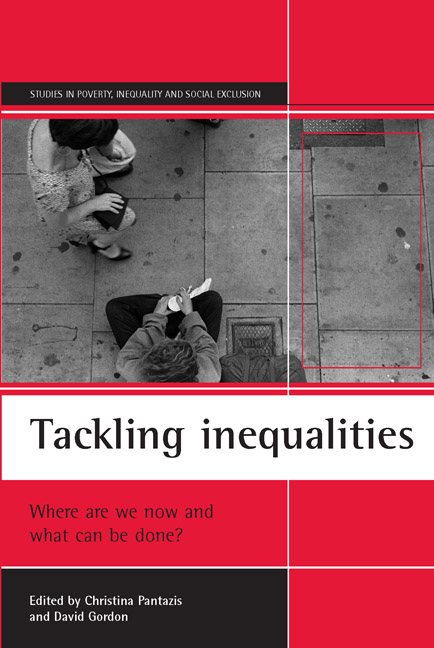Book contents
- Frontmatter
- Contents
- List of tables and figures
- Preface
- Acknowledgements
- List of acronyms
- Notes on contributors
- 1 Introduction
- 2 Inequalities in income, wealth and standard of living in Britain
- 3 Inequalities in employment: problems of spatial divergence
- 4 Educational inequalities and Education Action Zones
- 5 How can we end inequalities in housing?
- 6 Tackling inequalities in crime and social harm
- 7 Poverty across the life-course and health
- 8 Inequalities in health service provision: how research findings are ignored
- 9 A mortality league table for Cabinet ministers?
- 10 Ending world poverty in the 21st century
- Index
8 - Inequalities in health service provision: how research findings are ignored
Published online by Cambridge University Press: 05 July 2022
- Frontmatter
- Contents
- List of tables and figures
- Preface
- Acknowledgements
- List of acronyms
- Notes on contributors
- 1 Introduction
- 2 Inequalities in income, wealth and standard of living in Britain
- 3 Inequalities in employment: problems of spatial divergence
- 4 Educational inequalities and Education Action Zones
- 5 How can we end inequalities in housing?
- 6 Tackling inequalities in crime and social harm
- 7 Poverty across the life-course and health
- 8 Inequalities in health service provision: how research findings are ignored
- 9 A mortality league table for Cabinet ministers?
- 10 Ending world poverty in the 21st century
- Index
Summary
Research findings are low down the list of factors that influence government policies. Since governments of every political hue are concerned with present power and future survival, it appears that political considerations, pressure groups, influence pedlars and the media lead in the battle for the government's mind.
Yet, as researchers, we continue to think that our reports would carry considerable weight with government ministers and civil servants, if they would only read them. We need to ask why so much of what we do is ineffective in bringing about change. We talk to each other in the research community but who in government listens?
We try to remain aware of our own prejudices and hidden agendas, working to establish the validity and reliability of our findings. However, there is no such attempt at dispassionate appraisal by a government reactive to pressures and events. Research findings are an embarrassment, offending the emperor by pointing to the lack of research clothing. Even when lip-service is paid to research, the citations are often so selective that the exercise has no intellectual or moral credibility, lacking an independent appraisal of what is cited.
When governments do pursue socially acceptable policies, this is rarely if ever because research has highlighted the disparities and inequalities of current policies. More usually, it is because there is strong political or moral pressure to introduce changes which have political appeal.
This chapter describes a number of specific examples where research findings appear to have been ignored.
Health inequalities: the awkward genie
Inequalities in health and healthcare remain the awkward genie that will not dematerialise. The Black Report (DHSS, 1980) and the subsequent Townsend and Davidson study (Townsend and Davidson, 1982) showed the reality of the class divide in Britain and the relationship between material poverty, poorer health and worse healthcare (see Chapter Seven). Of seminal importance at the time, it continues to haunt succeeding governments.
The previous administration argued that the cost of meeting the Black recommendations was “quite unrealistic in present or any foreseeable economic circumstances, quite apart from any judgement that may be formed of the effectiveness of such expenditure in dealing with the problems identified” (Patrick Jenkin, Secretary of State, in his Foreword to the Black Report [DHSS, 1980]).
- Type
- Chapter
- Information
- Tackling InequalitiesWhere Are We Now and What Can Be Done?, pp. 159 - 180Publisher: Bristol University PressPrint publication year: 2000



